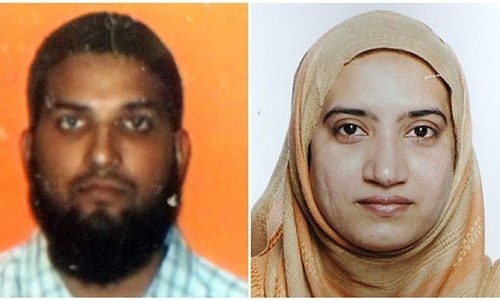WASHINGTON: Apple Inc., which makes computers and iPhones, said on Wednesday that it would not obey an order from a US federal judge to help the FBI access data on a phone used by San Bernardino shooters.
Syed Rizwan Farook and his wife Tashfeen Malik killed 14 people at a holiday gathering in San Bernardino, California, in December. They were also killed by police after a chase.
On Tuesday, a federal judge in California ordered Apple to provide the FBI access to data on an iPhone 5c that Syed Farook was using. Judge Sheri Pym also ordered Apple to help build special software for FBI for unlocking the phone.
In an open letter to Apple customers, the company’s CEO, Tim Cook, said he could not accept this “unprecedented step”, which “threatens the security” of its customers. We oppose this order, which has implications far beyond the legal case at hand,” he wrote.
“This moment calls for public discussion, and we want our customers and people around the country to understand what is at stake.”
Mr Cook noted that smartphones had become an essential part of people’s lives who use them to store “an incredible amount of personal information”, from private conversations to photos, music, notes, calendars, contacts, financial information and health data, “even where we have been and where we are going”.
He said that Apple customers expected the company to do everything in its power to protect their personal information, and “at Apple we are deeply committed to safeguarding their data”.
He noted that compromising the security of “our personal information can ultimately put our personal safety at risk. That is why encryption has become so important to all of us.”
Mr Cook noted that for many years, Apple had used encryption to protect its customers’ personal data because it believed it was the only way to keep their information safe.
“We have even put that data out of our own reach, because we believe the contents of your iPhone are none of our business,” he wrote.
Mr Cook said that like others in the United States, Apple and its employees were also “shocked and outraged” by the deadly act of terrorism in San Bernardino last December.
He wrote that the FBI asked Apple for help in the days following the attack, and the company worked hard to support the government’s efforts to solve this horrible crime.
“When the FBI has requested data that’s in our possession, we have provided it. Apple complies with valid subpoenas and search warrants, as we have in the San Bernardino case,” he wrote. “We have done everything that is both within our power and within the law to help them.”
Explaining why he could not comply with the latest court order, Mr Cook wrote: “Now the US government has asked us for something we simply do not have, and something we consider too dangerous to create. They have asked us to build a backdoor to the iPhone.”
Published in Dawn, February 18th, 2016














































